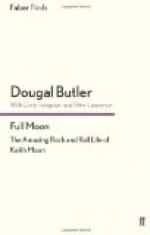He examined the room. There was a leather-topped writing-table with drawers, several cabinets filled with manuscripts and papers, some walnut chairs with carved legs, and a tall deep bookcase filled with dreary-looking books. His eyes wandered over the titles of the volumes. They also belonged to a bygone period—a melancholy accumulation of works as dead as their writers. Two whole shelves were occupied with the numbers of a forgotten periodical which claimed to give “ample details of the unhappy difference between Queen Caroline of Great Britain and her consort George the Fourth.” Barrant wondered idly why human nature was always so interested in the washing of dirty linen. Above these was ranged a row of published sermons. Barrant’s eye roamed higher and fell on a fat sturdy volume wedged in between some slimmer books. The title of this book was “Clocks of All Periods.” Clocks!
He reached for the volume and placed it on the table. A cursory glance through the pages conveyed the suggestion that it contained more information about clocks than was worth acquiring or writing down. There was a chapter on water clocks, to begin with: “Known to the Egyptians and the Holy Land.” Barrant turned the leaves. “The Ancient Chinese used a smouldering wick as timekeeper.” Barrant shook his head impatiently. “King Alfred’s supposed device of measuring Time by Candles—a Myth.” Would to heaven his invention of juries was a myth, too. Scotland Yard would get on much better without them. “A Lamp-clock was another Simple and Ingenious Design.” How intolerably long-winded the writer was. What had he to say about hood clocks? “Very few of the Early Clocks had Dials. The Device was generally a Mechanical Figure which struck the Hour on a Bell.” Evidently the forerunner of the devilish alarum clock. “Early clockmakers—Old English monks as Clockmakers.” The pages flowed rapidly through Barrant’s fingers. “Introduction of Minute Hand Marks—Period of Clocks Showing Tides—Longfaced Clocks.” Ah, here it was at last—“Hood Clocks.”
He began to read the chapter with interest, but as he was about to turn the first page the silence of the room was broken by a faint cackling laugh—an elfin sound which died away instantly. He looked up, startled. His surprise was not lessened at the sight of Mrs. Thalassa watching him from the open doorway. She entered on tiptoe, with a strange air of caution, examining him with restless eyes.
“I heard you,” she mumbled. “I saw you go upstairs. Mr. Thalassa was out, and I was afraid to go to the door. I’ve been playing patience, and it won’t come out.”
She showed her apron full of small cards. She placed them on the table, and arranged them in rows.
A new idea came into Barrant’s mind as he looked at her. If the poor creature had recovered sufficient wits to take to her cards again she might be coaxed to recall what she had seen on the night of the murder. He drew near her. “Can I help you?” he said.




